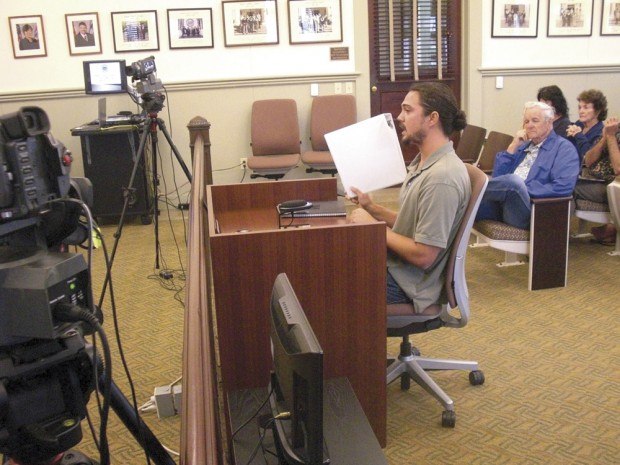Council passes Koloa Camp resolution
LIHU‘E — After more than six hours of discussion, 200-plus pieces of written testimony and numerous amendments on Wednesday, the Kaua‘i County Council unanimously passed a resolution requesting that Grove Farm Co. meet with its Koloa Camp tenants to explore alternatives to eviction.
A landlord has every right to evict its tenants, Council Chair Jay Furfaro said, and the county has no legal power to involve itself in a landlord-tenant issue. The resolution is a non-binding request.
On Nov. 8, Grove Farm mailed eviction notices to its tenants of Koloa Camp — a more than 100-year-old, sugar-era neighborhood also known as Japanese Camp C — in preparation for a new housing development called Waihohonu.
The development will consist of 50 prefabricated homes on 12 acres ranging from 500 square feet to 1,200 square feet and priced at $220,000 to $480,000, Grove Farm VP Mike Tresler told The Garden Island in December.
If everything goes as planned for Grove Farm and tenants cooperate with their eviction (recently extended to April 8), the company could have the first homes ready for sale in six to nine months, Grove Farm project manager David Hinazumi told the council Wednesday. He was the sole representative present to testify on behalf of the company.
Councilwoman JoAnne Yukimura, who introduced the resolution with Councilman Kipukai Kualii, said they hope for a win-win that would allow for a new housing development in Koloa while factoring in the needs of long-time tenants of the small, historic community, many of whom are seniors.
Koloa Camp resident Kepa Kruse, 29, was born in the camp and raised there by his father, John Kruse. He has been a vocal supporter of saving the historic camp. On Wednesday, he handed the council a petition supporting Koloa Camp residents containing 2,034 signatures.
“I agree this is very much a tenant-landlord issue,” Kruse said, “but there are 2,000 members of this community that are willing to stand up and fight for their community. Why do we have to sacrifice housing that already exists to create new housing? There are alternatives.”
Kruse has searched for alternatives that would satisfy Grove Farm’s desire to develop a profitable project while preserving the existing community. Two alternatives have been presented to the company: allow another interested buyer, Peter Savio, to purchase the land and preserve the community, or else move the project to Grove Farm’s land on the other side of the highway currently zoned for agriculture.
Koloa Community Association president Louis Abrams, in a letter to the council in support of the rezoning, said Kruse proposed an innovative solution to state Senators on Feb. 28.
“He proposed to extend R-6 zoning separated by the Bypass Road,” Abrams said. “We support this resolution. Koloa Community Association would support rezoning from ag to R-6 because it’s a logical place to have additional housing … It’s a win-win situation for all.”
However, Councilwoman Nadine Nakamura said rezoning from agricultural to residential could take two to three years and could cost hundreds of thousands of dollars.
“Time is money for corporations,” she said, “and we need to keep that in mind.”
Hinazumi said the alternatives proposed by the community to Grove Farm do not allow the company to meet its goals of having a housing project ready in six to nine months. The company turned down Savio’s offer earlier this year to buy the land for the appraised value with the intent of subdividing it and selling it back to the residents at cost.
In testimony to the council, Phoebe Eng of Waimea said eviction is too brutal a hammer and asked the council to support the resolution.
“This resolution poses a simple task to the council, to show its moral leadership,” she said. “The question is how much you’re willing to stand on the side of people, prioritize human life above profits. The resolution does not involve landlord-tenant issues. It merely opens communications to avoid legal battles. …If zoning changes are needed, let’s work together to change them.”
Aside from Hinazumi, the only lack of support for the resolution came from Craig Contrades, a tenant of Grove Farm but not Koloa Camp.
“There’s something disturbing about this resolution,” he said. “I don’t see how it’s the business of our legislative bodies at the state or county. I don’t think there’s a lot of wisdom in putting the county at this kind of risk.”
He said his grandfather ran the Kapa‘a Cannery, and his family has a plantation background.
“It’s gone and that’s sad,” he said. “I get what’s going on here. It’s politics, I get that. How many landowners do you know that are seeking out housing for their tenants after evicting them? If Grove Farm makes a (bad) investment, will council intervene? Lots of people are losing their homes. I don’t see how it’s the kuleana of this legislative body.”
Furfaro replied that it has been the practice of the council to participate in such issues because it is the steward of the land.
“We have no actual jurisdiction in causing an action,” he said, “but we do have an opportunity to facilitate positive outcomes.”
Councilman Mel Rapozo repeatedly expressed concern that such a resolution could expose the county to a lawsuit.
Council members consulted with Deputy Prosecuting Attorney Monica Clark, who advised removing and changing some of the potentially troublesome language.
The council amended the resolution as advised and, after a few other tweaks, concluded with a resolution with which council members could agree.
• Vanessa Van Voorhis, staff writer, can be reached at 245-3681, ext. 251, or by emailing vvanvoorhis@thegardenisland.com.

